Article MT169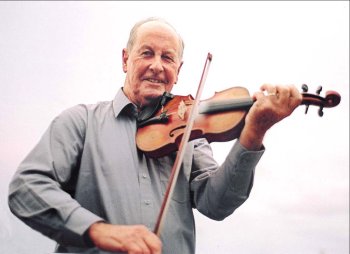
Alex Francis MacKay
Gaelic in the Bow
with Gordon MacLean (Rounder CD7059)
Autobiographical statement:
I was born August 13, 1922 and I got interested in fiddling in 1936 when I was about fourteen. There were several fiddlers that used to come to the house and I got interested a lot after listening to them. I picked up quite a few tunes by ear and in two or three years time I got onto reading music. Jimmie Gillis from Margaree used to be up at the house often and he gave me some pointers on reading. When I got a little better, I got to playing for dances in the old schoolhouses - there were no halls around in our area then. 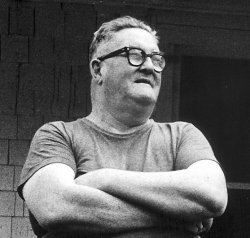 Those schools weren’t very big - there was only room for two or three sets. There were no sound systems back then, but you hardly needed them in those little schools. Willie John MacEachern and I played together quite a bit back then, and I played with Dan R MacDonald and Dan Hughey MacEachern a bit as well. There was no big money in it - a couple of dollars, I guess.
Those schools weren’t very big - there was only room for two or three sets. There were no sound systems back then, but you hardly needed them in those little schools. Willie John MacEachern and I played together quite a bit back then, and I played with Dan R MacDonald and Dan Hughey MacEachern a bit as well. There was no big money in it - a couple of dollars, I guess.
Dan R was my first cousin and Buddy MacMaster’s my second cousin: my mother Mary was a Campbell from Judique and she’d be first cousin to Buddy’s mother and a sister to Dan R’s father. My mother didn’t play but she loved music: she could pick up a tune as fast as I could. My father Angus could play a little bit on the fiddle, not much: just the old style fiddling. 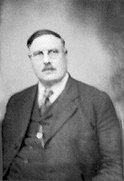 But he was too busy to play much. He was a blacksmith and a farmer besides - he didn’t spend much time on fiddling. He quit blacksmithing when I was about twelve or fourteen, when they starting having more cars and using horses less (that shoeing horses was rough work). I had two brothers that played too: one of them died young, at twenty-two, and my father always said that Danny would have been a great fiddler if he had lived. And my brother Peter was very good too, a good strathspey player, but he died ten or twelve years ago.
But he was too busy to play much. He was a blacksmith and a farmer besides - he didn’t spend much time on fiddling. He quit blacksmithing when I was about twelve or fourteen, when they starting having more cars and using horses less (that shoeing horses was rough work). I had two brothers that played too: one of them died young, at twenty-two, and my father always said that Danny would have been a great fiddler if he had lived. And my brother Peter was very good too, a good strathspey player, but he died ten or twelve years ago.
Gordon MacQuarrie used to be at our house quite often: he’d stay for two or three days. He was quite a musician: he had a lot of old tunes. I was very interested in him and he wasn’t stubborn about playing either - he liked to play. He had gotten in touch with some Beaton fellow in Boston in 1940 and put out The Cape Breton Collection with a lot of his own tunes in it and some by others. He was a very bright man - he was self taught: he learned to read and compose music, to write poetry and play the pipes. In those days the popular violinists were Angus Allan Gillis, Angus Chisholm, and Danny J Campbell, because they had made some records. I’ve been told that Bernie MacIsaac of the Celtic Music Store in Antigonish had originally planned that Gordon MacQuarrie should record with them. 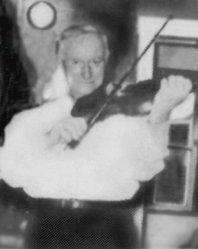 The story I heard was that they were on their way to Montreal and stopped in Antigonish and Gordon got to drinking. Angus Chisholm was on his way home from Boston and happened to meet them in Antigonish, so MacIsaac decided to send him to Montreal instead of Gordon. So that’s what the booze will do, I guess.
The story I heard was that they were on their way to Montreal and stopped in Antigonish and Gordon got to drinking. Angus Chisholm was on his way home from Boston and happened to meet them in Antigonish, so MacIsaac decided to send him to Montreal instead of Gordon. So that’s what the booze will do, I guess.
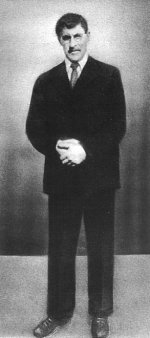 This Jimmie Gillis I mentioned was a pretty fair fiddler. He was the son of Malcolm Gillis who was known as 'The Bard of Margaree' for his Gaelic poetry and several of the boys were good violinists: Jimmie, Alex, Ambrose and Malcolm. And Big Ronald MacLellan came to the house several times when I was a kid. I couldn’t get over the size of him. He was six foot five and weighed two hundred fifty pounds or something like that: a huge man. He was a blacksmith like my dad and a real good one, I’m told. He stood up to play when he played and I’d just stare at the size of him. One time there was a guy there that had a fiddle that he wanted Ronald to try and I still remember the first tune he played to try out that fiddle: it was Lady Georgina Campbell. But then this guy asked him, “Play St Anne’s Reel,” and Big Ronald quit right away - he didn’t like requests unless they were good ones. He was pretty touchy: you’d have to keep very quiet when he was playing but he was a great musician. And I remember he and Gordon being at the house another time and they played together, for they were used to doing that. And Donald, his son, was often at the house as well.
This Jimmie Gillis I mentioned was a pretty fair fiddler. He was the son of Malcolm Gillis who was known as 'The Bard of Margaree' for his Gaelic poetry and several of the boys were good violinists: Jimmie, Alex, Ambrose and Malcolm. And Big Ronald MacLellan came to the house several times when I was a kid. I couldn’t get over the size of him. He was six foot five and weighed two hundred fifty pounds or something like that: a huge man. He was a blacksmith like my dad and a real good one, I’m told. He stood up to play when he played and I’d just stare at the size of him. One time there was a guy there that had a fiddle that he wanted Ronald to try and I still remember the first tune he played to try out that fiddle: it was Lady Georgina Campbell. But then this guy asked him, “Play St Anne’s Reel,” and Big Ronald quit right away - he didn’t like requests unless they were good ones. He was pretty touchy: you’d have to keep very quiet when he was playing but he was a great musician. And I remember he and Gordon being at the house another time and they played together, for they were used to doing that. And Donald, his son, was often at the house as well.
I heard Ronald’s first son, Little Joe, once: he died young when he was only eighteen or nineteen of TB, I guess. An awful lot of guys died from that back in that time - that TB was pretty contagious. Joe was a dark, thin fellow - he didn’t look like the other MacLellans at all. Ronald had been born in Broad Cove but he was brought up at his aunt’s in Glendale about two miles beyond my place, and so they all used to go up visiting in Glendale often. On this particular day Joe had been up to his uncle’s visiting and then he called at our house. We gave him the violin and he played quite a few tunes; I thought he was very good. I remember a couple of the tunes he played, although I was only a kid: Rothiemurchus Rant, and The Braes of Auchtertyre reel. Sometimes I remember what I heard as a kid better than what happened two months ago!
Dan R used to be up at our place a lot: he’d stay for four or five days at a time and he’d play tunes for us, including some of the ones he composed himself. I don’t know of anyone that had so many tunes as he did. I remember one day when Dan R was over at Dan Hughey’s MacEachern’s in Queensville and he started over to my place walking. He had the fiddle, I guess, and so he composed a tune on the way over: just sat by the side of the road and composed a tune, 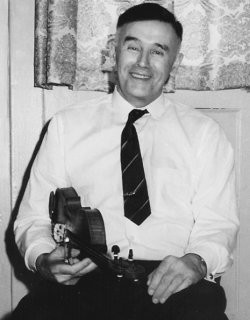 which he called The Roadside Polka. When he got to my place, he demanded a manuscript right away to write it down. So that’s the way the tunes were coming to him, I guess.
which he called The Roadside Polka. When he got to my place, he demanded a manuscript right away to write it down. So that’s the way the tunes were coming to him, I guess.
Back before Dan R’s time, there weren’t so many composers around in Cape Breton. Big Ronald composed a few that were in The Cape Breton Collection and it was mainly made up of Gordon MacQuarrie’s own tunes. But then Dan Hughey began to write some pretty good tunes and then others followed. Dan Hughey’s health was never very good: he had TB at one time, but he got over it and then he had asthma and, after that, Parkinson’s Disease. But Dan Hughey was very determined for a man that wasn’t very well: he did a lot of playing and composed a lot of good tunes. He was a very fine man.
When Dan R was overseas in Scotland during World War II, he got in touch with J Murdoch Henderson - he was quite a musician, I’m told. He knew where the book stores were and so Dan R got quite a bunch of music that way. And they weren’t really selling them back then: they were practically giving them away or sending them to the dump. Oh, but there was a lot of music in those books: Skinner’s and Henderson’s; the Gows, Marshall’s and Captain Simon Fraser and a lot more. And Dan R shipped them over to Dan Hughey who was still home and he told Dan Hughey that, when he was finished with them, to give them to me. So that’s how I got most of my books and, if I live another fifty years, I wouldn’t be able to learn all the tunes in them. There’s a stack of them a foot high at home: a couple dozen of them. I like Marshall’s and the Gows and Skinner’s, too: his tunes are more difficult. Gordon MacQuarrie was the first guy that I know who had the Skye Collection - whatever he did with it I, don’t know, but as a youngster I heard that he had that book.
In 1955 I went to Windsor, Ontario to work for Chrysler. There were quite a few Cape Bretoners in Windsor then - they used to have a Cape Breton Club and I played for the dances there and I used to go over to Detroit for parties as well. I used to play for dances for John Willie MacKinnon from Port Hood. He used to put on dances in Detroit and so I played for him and a few weddings. But I got laid off in ’57 and so I had to come home; I was only there a few years. After a few years, I got on at the pulp mill down at the shore and I worked there for twenty five years. We had quite a few dances around Glendale when they built the new hall there - I played there for three summers. But nowadays I mainly just play in the concerts.
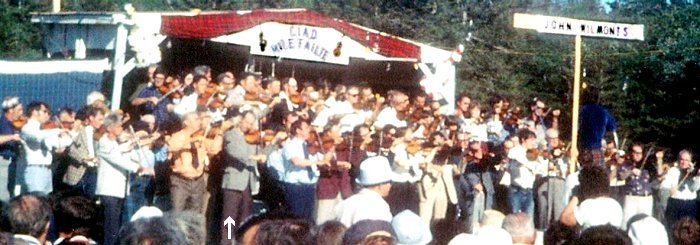
My parents spoke Gaelic all the time and everyone of us kids spoke Gaelic everyday: ten of us in the family, seven boys and three girls. Two of them died young - one at twenty-one and one at twenty-five - and I’m the baby of the family. Well, I’m a pretty old baby now - I’m eighty-one. I learned English in the schools but I’d still just as soon speak Gaelic if I have somebody to talk to. My wife doesn’t speak it, but she understands it. Back when my brother Jimmie was alive, we used to speak Gaelic all the time in the house, but there’s less and less people around that know the language now.
Alex Francis MacKay
About this record
This record almost literally crept up on us by surprise. Alex Francis already has a fine CD available on Rounder, A Lifelong Home (CD 7020), produced by Paul Cranford and Paul MacDonald, as well as several selections on Traditional Fiddle Music of Cape Breton, volume 1 (CD 7037). But Morgan MacQuarrie and I have been doing a fair amount of recording of late at Gordon and Hazel MacLean’s house in Sugar Camp and, since Alex Francis doesn’t live too far away, he would often drop by for a bit of hospitality. And because one always wants to beg a set or two from Alex Francis whenever he is around and, since I had the recording equipment sprawling across the MacLeans’ living room already, it seemed natural to tape these performances. After awhile, Gordon and I realized, “Gee, we’ve got the makings of a pretty good record here.” It so happened that Bill Nowlin, one of Rounder’s owners, happened to along at one of these sessions, so we asked him, “Do you think that you would be able to put this music out in your new Archive series?” and Bill immediately agreed.
And so we have a record of wholly off-the-cuff performances: simply medleys that Alex Francis felt like playing at the time (which is why we hear repetitions of a few tunes, both internally and with respect to A Lifelong Home). Possibly for that very reason, I think these recordings nicely capture the stately and unruffled beauty that is integral to Alex Francis’ music and which makes his performances so instantaneously recognizable to any aficionado of older style Cape Breton fiddling. 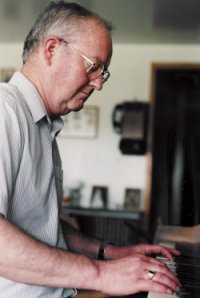 As Alex Francis indicates, he has extracted a fair number of these pieces from the old Scottish tune books (or, quite often, first heard the melodies as traditionally played and then looked them up for accuracy’s sake). But it is his distinctive manner of approach - the way he converts a march from an old piper’s manual into a supreme articulation of pride and melancholy, for example - that immediately leads knowledgeable Cape Bretoners to comment, “Oh, Alex Francis: you can really hear the Gaelic in his bow” (and in his left hand trills and flicks as well, I might add). Whether or not one must be born a first language Gaelic speaker to articulate melodies in this manner (as is often claimed), we can be morally certain that there will be few artists that will ever be able to match Alex Francis in his command of this exceptional musical vernacular.
As Alex Francis indicates, he has extracted a fair number of these pieces from the old Scottish tune books (or, quite often, first heard the melodies as traditionally played and then looked them up for accuracy’s sake). But it is his distinctive manner of approach - the way he converts a march from an old piper’s manual into a supreme articulation of pride and melancholy, for example - that immediately leads knowledgeable Cape Bretoners to comment, “Oh, Alex Francis: you can really hear the Gaelic in his bow” (and in his left hand trills and flicks as well, I might add). Whether or not one must be born a first language Gaelic speaker to articulate melodies in this manner (as is often claimed), we can be morally certain that there will be few artists that will ever be able to match Alex Francis in his command of this exceptional musical vernacular.
Gordon MacLean often serves as Alex Francis’ accompanist and his sympathetic and understated support is greatly prized by most of Cape Breton’s traditional players. He has also acted as an uncredited third partner in the efforts of Morgan MacQuarrie and myself to complete a survey of as many of the island’s older style players as possible (Gordon can be heard as accompanist on many of our projects in the NAT series). In addition, the hospitable environment of Gordon and Hazel’s house contributes significantly to the quality of the music heard here and the same can be said of the appreciative audiences who were present in some combination or other at these sessions: Bonnie Jean MacLean, Doug MacPhee, Morgan MacQuarrie, Joe Peter MacLean and Paul Wukitsch, Bill Nowlin and Burt Feintuch. We’d also like to thank Jim Watson for his help with the project and Paul Cranford and John Donald Cameron for identifying some of the titles that Alex Francis had forgotten.
For a fuller account of Alex Francis’ music, consult the fine booklet to A Lifelong Home and (if you can find them) the excellent Topic LP anthologies recorded in the 1970s by John Shaw and Rosemary Hutchison. Many of the musicians Alex Francis mentions are now generally regarded as the cream of Cape Breton’s golden age of traditional fiddling and capsule biographies of many of them can be found in Allister MacGillivray’s The Cape Breton Fiddler.
Mark Wilson
The selections:
1. Jenny Carruthers (John MacColl) - march; Lady Madelina Sinclair (Niel Gow) - strathspey; Mr Compton of Compton Hall - reel.
2. Miss Mariane Oliphant (Robert MacIntosh), Lady Charlotte Campbell (Nathaniel Gow), Munlochy Bridge - strathspeys; Lady Rothes - reel.
3. Glengrant (J S Skinner), Mr Eager’s (Joseph Lowe) - strathspeys; Thrum’s Cairn (J S Skinner), The Yetts of Muckart (J S Robertson) - reels.
4. Memories of Joe MacInnis (Dan R MacDonald, SOCAN) - marching air; The Marquis of Lorn (Niel Gow), Lassie, Look Before You (William Marshall) - strathspeys; The Lasses of Stewarton, Geordie MacLeish - reels.
 5. Watson’s Class (sound clip), Unknown, Struan Robertson’s Rant - strathspeys; Keep it Up - reel.
5. Watson’s Class (sound clip), Unknown, Struan Robertson’s Rant - strathspeys; Keep it Up - reel.
6. The Prince of Wales, Rosin the Bow, Graham’s Highland Fling - jigs. (Originally a song entitled Old Rosen the Beau, the second jig has been employed as a melody for many nineteenth century songs: Down in the Willow Garden, Lincoln and Liberty, Acres of Clams, etc.)
7. Professor Blackie (J S Skinner) - melody; Milton Duff (J S Skinner), Clach na Cudain - strathspeys; Geordie MacLeish, The Pitnacree Ferryman - reels.
 8. Sandlaw’s Welcome (J S Skinner) - pastoral; Bogniebrae (J S Skinner), Hoch! Hey! Johnnie Lad, The Bog o’ Gight (Wm Marshall) - strathspeys; The Lea Rig, Bonnie Nellie (sound clip) (J S Skinner), Pretty Marion - reels.
8. Sandlaw’s Welcome (J S Skinner) - pastoral; Bogniebrae (J S Skinner), Hoch! Hey! Johnnie Lad, The Bog o’ Gight (Wm Marshall) - strathspeys; The Lea Rig, Bonnie Nellie (sound clip) (J S Skinner), Pretty Marion - reels.
9. The Maids of Arrochar (John MacDonald, Dundee), Lady Muir MacKenzie’s Favourite - airs.
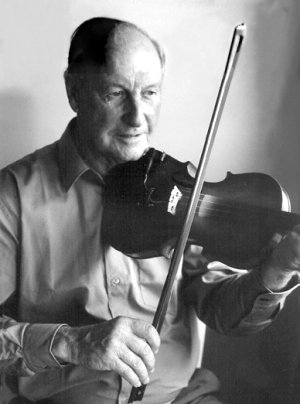 10. Dr MacLeod of Alnwick (A Ross), Lord Blantyre (Niel Gow) - strathspeys; The Reel of Cluny (Jos Lowe), Goodenwell (James Walker) - reels.
10. Dr MacLeod of Alnwick (A Ross), Lord Blantyre (Niel Gow) - strathspeys; The Reel of Cluny (Jos Lowe), Goodenwell (James Walker) - reels.
11. Miss Forbes of Pitsligo (John Gow), Miss Grace Menzies (Wm Marshall) - strathspeys; Mrs Charles Stewart (Wm Marshall), The Whigs of Fife, Miss Susan Gordon (Wm Marshall) - reels.
 12. Mrs James Christie (J S Skinner) - minuet; Mrs Henry Lumsden of Tillwhilly (sound clip) - strathspey; Lady Elizabeth Lindsay (Nathaniel Gow), Miss Watt, Miss Menzie of Menzies - reels.
12. Mrs James Christie (J S Skinner) - minuet; Mrs Henry Lumsden of Tillwhilly (sound clip) - strathspey; Lady Elizabeth Lindsay (Nathaniel Gow), Miss Watt, Miss Menzie of Menzies - reels.
13. The Concert March (Dan R MacDonald, SOCAN), Niel Gow’s (Duncan MacIntyre), Largo Law - strathspeys; Miss Compton of Compton Hall, Raigmore House - reels.
Credits:
- Produced by Mark Wilson
- Recorded in Sugar Camp, Nova Scotia, 2002-4, at the home of Gordon and Hazel MacLean.
- Notes by Alex Francis MacKay and Mark Wilson.
- Tune identifications by Paul Cranford and John Donald Cameron.
- Photography by Mark Wilson.
- Special thanks to Paul Cranford, Jim Watson, Morgan MacQuarrie and Gordon and Hazel MacLean.
13.10.05
Article MT169
Site designed and maintained by Musical Traditions Web Services Updated: 14.10.05
 But he was too busy to play much. He was a blacksmith and a farmer besides - he didn’t spend much time on fiddling. He quit blacksmithing when I was about twelve or fourteen, when they starting having more cars and using horses less (that shoeing horses was rough work). I had two brothers that played too: one of them died young, at twenty-two, and my father always said that Danny would have been a great fiddler if he had lived. And my brother Peter was very good too, a good strathspey player, but he died ten or twelve years ago.
But he was too busy to play much. He was a blacksmith and a farmer besides - he didn’t spend much time on fiddling. He quit blacksmithing when I was about twelve or fourteen, when they starting having more cars and using horses less (that shoeing horses was rough work). I had two brothers that played too: one of them died young, at twenty-two, and my father always said that Danny would have been a great fiddler if he had lived. And my brother Peter was very good too, a good strathspey player, but he died ten or twelve years ago.

 Those schools weren’t very big - there was only room for two or three sets. There were no sound systems back then, but you hardly needed them in those little schools. Willie John MacEachern and I played together quite a bit back then, and I played with Dan R MacDonald and Dan Hughey MacEachern a bit as well. There was no big money in it - a couple of dollars, I guess.
Those schools weren’t very big - there was only room for two or three sets. There were no sound systems back then, but you hardly needed them in those little schools. Willie John MacEachern and I played together quite a bit back then, and I played with Dan R MacDonald and Dan Hughey MacEachern a bit as well. There was no big money in it - a couple of dollars, I guess.
 The story I heard was that they were on their way to Montreal and stopped in Antigonish and Gordon got to drinking. Angus Chisholm was on his way home from Boston and happened to meet them in Antigonish, so MacIsaac decided to send him to Montreal instead of Gordon. So that’s what the booze will do, I guess.
The story I heard was that they were on their way to Montreal and stopped in Antigonish and Gordon got to drinking. Angus Chisholm was on his way home from Boston and happened to meet them in Antigonish, so MacIsaac decided to send him to Montreal instead of Gordon. So that’s what the booze will do, I guess.
 This Jimmie Gillis I mentioned was a pretty fair fiddler. He was the son of Malcolm Gillis who was known as 'The Bard of Margaree' for his Gaelic poetry and several of the boys were good violinists: Jimmie, Alex, Ambrose and Malcolm. And Big Ronald MacLellan came to the house several times when I was a kid. I couldn’t get over the size of him. He was six foot five and weighed two hundred fifty pounds or something like that: a huge man. He was a blacksmith like my dad and a real good one, I’m told. He stood up to play when he played and I’d just stare at the size of him. One time there was a guy there that had a fiddle that he wanted Ronald to try and I still remember the first tune he played to try out that fiddle: it was Lady Georgina Campbell. But then this guy asked him, “Play St Anne’s Reel,” and Big Ronald quit right away - he didn’t like requests unless they were good ones. He was pretty touchy: you’d have to keep very quiet when he was playing but he was a great musician. And I remember he and Gordon being at the house another time and they played together, for they were used to doing that. And Donald, his son, was often at the house as well.
This Jimmie Gillis I mentioned was a pretty fair fiddler. He was the son of Malcolm Gillis who was known as 'The Bard of Margaree' for his Gaelic poetry and several of the boys were good violinists: Jimmie, Alex, Ambrose and Malcolm. And Big Ronald MacLellan came to the house several times when I was a kid. I couldn’t get over the size of him. He was six foot five and weighed two hundred fifty pounds or something like that: a huge man. He was a blacksmith like my dad and a real good one, I’m told. He stood up to play when he played and I’d just stare at the size of him. One time there was a guy there that had a fiddle that he wanted Ronald to try and I still remember the first tune he played to try out that fiddle: it was Lady Georgina Campbell. But then this guy asked him, “Play St Anne’s Reel,” and Big Ronald quit right away - he didn’t like requests unless they were good ones. He was pretty touchy: you’d have to keep very quiet when he was playing but he was a great musician. And I remember he and Gordon being at the house another time and they played together, for they were used to doing that. And Donald, his son, was often at the house as well.
 which he called The Roadside Polka. When he got to my place, he demanded a manuscript right away to write it down. So that’s the way the tunes were coming to him, I guess.
which he called The Roadside Polka. When he got to my place, he demanded a manuscript right away to write it down. So that’s the way the tunes were coming to him, I guess.

 As Alex Francis indicates, he has extracted a fair number of these pieces from the old Scottish tune books (or, quite often, first heard the melodies as traditionally played and then looked them up for accuracy’s sake). But it is his distinctive manner of approach - the way he converts a march from an old piper’s manual into a supreme articulation of pride and melancholy, for example - that immediately leads knowledgeable Cape Bretoners to comment, “Oh, Alex Francis: you can really hear the Gaelic in his bow” (and in his left hand trills and flicks as well, I might add). Whether or not one must be born a first language Gaelic speaker to articulate melodies in this manner (as is often claimed), we can be morally certain that there will be few artists that will ever be able to match Alex Francis in his command of this exceptional musical vernacular.
As Alex Francis indicates, he has extracted a fair number of these pieces from the old Scottish tune books (or, quite often, first heard the melodies as traditionally played and then looked them up for accuracy’s sake). But it is his distinctive manner of approach - the way he converts a march from an old piper’s manual into a supreme articulation of pride and melancholy, for example - that immediately leads knowledgeable Cape Bretoners to comment, “Oh, Alex Francis: you can really hear the Gaelic in his bow” (and in his left hand trills and flicks as well, I might add). Whether or not one must be born a first language Gaelic speaker to articulate melodies in this manner (as is often claimed), we can be morally certain that there will be few artists that will ever be able to match Alex Francis in his command of this exceptional musical vernacular.
 10. Dr MacLeod of Alnwick (A Ross), Lord Blantyre (Niel Gow) - strathspeys; The Reel of Cluny (Jos Lowe), Goodenwell (James Walker) - reels.
10. Dr MacLeod of Alnwick (A Ross), Lord Blantyre (Niel Gow) - strathspeys; The Reel of Cluny (Jos Lowe), Goodenwell (James Walker) - reels.